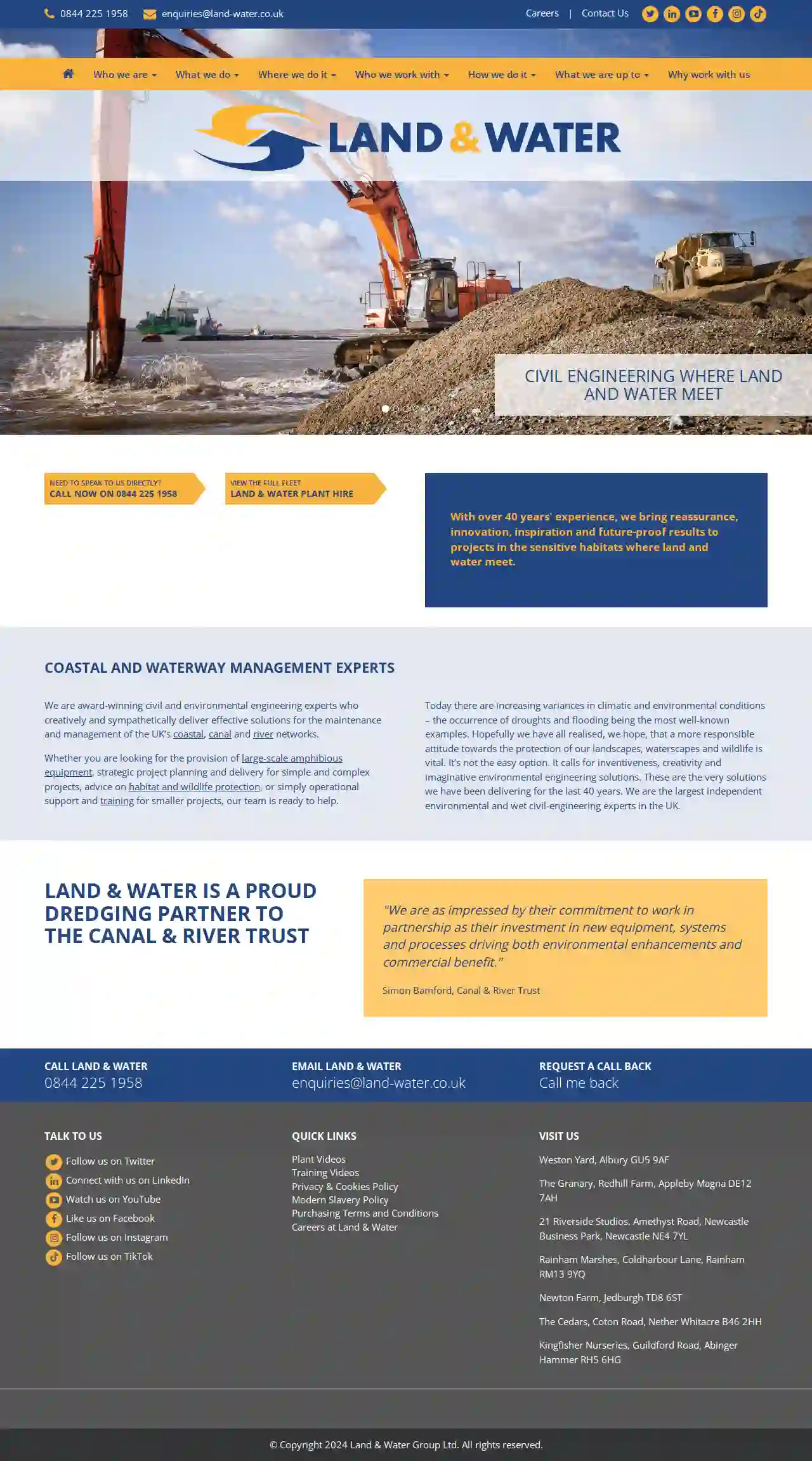Excavation Contractors Shalford
Best Excavating Contractors in Shalford
Receive up to 3 Excavation Company Near Me quotes for your project today! Compare profiles, reviews, accreditations, portfolio, etc... and choose the best deal.

Synergy Hire
3.76 reviewsDunham’s Lane, Letchworth, Hertfordshire, SG6 1LL, GBThe Synergy Hire Experience At Synergy, we are committed to becoming the business partner of choice for our customers. We want to share over 100 years of combined experience that our specialist management team have gained at the very pinnacle of the equipment hire industry. We Promise We will provide the youngest, most advanced excavators in the industry from our brand new fleet of Hitachi machines. We will deliver what you need, where and when you need it, even the next day. We will help you get the most from your hire, with training on maximising fuel efficiency, optimising operation and even sharing data from real time utilization reports. We want to exceed your expectations Discover More Located just twenty minutes from the M25, our HQ is strategically located to provide next day delivery, wherever you need it - nationwide.
- Services
- Why Us?
- Gallery
Get Quote
JD Groundwork (South East ) LTD
54 reviewsLittle Batson, Ashford Road, Bethersden, TN26 3AX, GBAbout JD Groundwork JD Groundwork is a highly experienced team of construction specialists in groundworks and civil engineering. We provide a wide range of services in the domestic and commercial sectors. We undertake work in Kent, Sussex, Surrey and the South East. Our Ethos Our ethos is to provide industry-leading skills, staff and technology as an expert partner to our clients in order to produce finished works that exceed expectations. Our Services We offer a wide range of groundwork services from smaller domestic projects to commercial work – all carried out to the highest standards at competitive prices. Our Team Our staff members produce consistent results and offer reliable work ethics on every project ensuring that works are delivered inline with regulation and industry best practice standards. Our Reputation The majority of our business comes from word-of-mouth recommendations, so we take great pride in our long-standing reputation as driveway and groundwork contractors that offer quality and reliability at a competitive price.
- Services
- Why Us?
- Testimonials
- Gallery
Get Quote
Land & Water Services Ltd
3.911 reviewsWeston Yard, Albury, GU5 9AF, GBAward-winning civil and environmental engineering experts With over 40 years' experience, we bring reassurance, innovation, inspiration and future-proof results to projects in the sensitive habitats where land and water meet. We are award-winning civil and environmental engineering experts who creatively and sympathetically deliver effective solutions for the maintenance and management of the UK’s coastal, canal and river networks. Whether you are looking for the provision of large-scale amphibious equipment, strategic project planning and delivery for simple and complex projects, advice on habitat and wildlife protection, or simply operational support and training for smaller projects, our team is ready to help. Today there are increasing variances in climatic and environmental conditions – the occurrence of droughts and flooding being the most well-known examples. Hopefully we have all realised, we hope, that a more responsible attitude towards the protection of our landscapes, waterscapes and wildlife is vital. It’s not the easy option. It calls for inventiveness, creativity and imaginative environmental engineering solutions. These are the very solutions we have been delivering for the last 40 years. We are the largest independent environmental and wet civil-engineering experts in the UK. Land & Water is a proud dredging partner to the Canal & River Trust "We are as impressed by their commitment to work in partnership as their investment in new equipment, systems and processes driving both environmental enhancements and commercial benefit." Simon Bamford, Canal & River Trust
- Services
- Why Us?
- Testimonials
- Gallery
Get Quote
Ashford Homes (South Western) Limited
3.47 reviewsDoric House, Middleton Drive, Doric House Middleton Drive Bradford on Avon Wiltshire, Bradford on Avon, BA15 1GB, GBWelcome to Ashford Homes A multi-award winning independent property developer Since 1990 we’ve established a strong track record of building luxury, high specification new homes in Wiltshire. No two developments are the same and each home is meticulously designed and rigorously evaluated for both aesthetics and the functionality of day to day use.
- Services
- Why Us?
- Accreditations
- Gallery
Get Quote
Nucore Construction Ltd
135 Gilders Road, Chessington, KT9 2EB, GBSiteLeaders in bespoke projects from conception to completion. Who are Nucore? In short - we are a group of dedicated professionals that thrive off of a passion for building and all things construction. We love what we do and it shows. We have a proven track record in delivering Design, Management and Construction services on programme and in budget. Creating unique buildings and unrivalled finishes with our skilled teams of experienced professionals. We deliver high quality projects across all sectors of construction from residential, commercial, retail, healthcare, and other sectors. Our services provide clients with a thorough, bespoke, turn key package catered to their individual project. As Nucore know, no two projects are ever the same! Why choose Nucore? We have an abundance of knowledge and experience on all aspects of our industry including: Health & Safety (CDM coordination) In depth expertise throughout all phases of the construction process Our design, management and construction teams boast a wealth of knowledge and skill within their sectors working on some of the most prestigious projects across the UK in the last 30 years 360 degree communication throughout the project by a dedicated project manager and design manager We have experience in CLT, SIP's, Green Oak & Timber Framing RC & Steel frame Construction Grade 1&2 Listed buildings Working with the National Trust and English Heritage Vast experience in building regulations, codes and law Working to NHBC codes and standards BIM Documentation control and transparency in our quotations An understanding, friendly, positive, and professional approach to our work & clients About Our Company Nucore specialise in providing a unique service for all our clients for all types of projects. This is accompanied with the best specialists and professionals in the industry to meet our exceptional quality and standards. 2018 Year of Establishment 18 Projects Completed 3 Ongoing Projects Robert Holmes Director/Owner, Nucore Construction Ltd
- Services
- Why Us?
- Our Team
- Gallery
Get Quote
J Searle Contractors Ltd
51 reviewsThe Pines, Green Lane East, Guildford, GU3 2JL, GBWelcome To J Searle Contractors Ltd J Searle Contractors are a leading groundworks company, offering a comprehensive range of services to both domestic and commercial clients across the South-East regions. We have been delivering our services across the South-East for over 3 generations. Professional Groundwork Specialists At J Searle Contractors Ltd, we take pride in being a leading provider of comprehensive groundwork services tailored to meet the diverse needs of our clients. With a rich legacy of expertise and commitment, we offer a range of groundwork solutions, ensuring precision, safety, and environmental responsibility during every project. Our Services J.Searle Contractors take pride in our reputation as being a reliable and trustworthy groundworks company with a focus on health and safety and environmental responsibility. We have been delivering our services across the South-East for over 3 generations.
- Services
- Why Us?
- Gallery
Get Quote
Romans Construction Ltd
5105 reviewsStudley Court Mews, Guildford Road, Chobham, GU24 8EB, GBProperty specialists for over 20 years Romans Construction has been providing home renovation services for over 2 decades, adding to the value of properties in Berkshire, Hampshire, Surrey & London. We don't use gimmicks or salesmen, we simply provide excellent workmanship and customer service to all our clients, all at extremely competitive prices. We are proud of the work we do and because of this we offer a 10 year guarantee on roofing, driveways, patios, decking and many other services.
- Services
- Why Us?
- Testimonials
- Gallery
Get Quote
Excavation Services Ltd
51 reviewsParklands Farm, Shere, GU5 9JQ, GBExcavation Services are trusted for their specialist knowledge, giving you peace of mind and a solid foundation for your building project. At Excavation Services we believe that collaboration achieves the best results. From initial introduction to your project, through design and then implementation, we aim to share our expertise on an open basis with you and your wider team. With a central focus on good planning and refined budgeting we aim to exceed your expectations and enhance delivery of your project. Our approach to quality control and safety is uncompromising. We employ only highly experienced and qualified people on site as well as director led design, estimating and delivery services.
- Services
- Why Us?
- Our Team
- Gallery
Get Quote
Guildford Landscapes Ltd
4.935 reviews7 Burnt hill, Plaistow Road, Godalming, GU8 4PG, GBGuildford Landscapes Ltd We are a family-run business with over 20 years of experience in the landscaping and paving industry. We are committed to providing our clients with the highest quality workmanship and customer service. We offer a wide range of services to meet your needs, from simple garden maintenance to complete landscaping projects. We are also proud to be approved members of the following associations: Our Services We offer a wide range of services to meet your needs, from simple garden maintenance to complete landscaping projects. We are also proud to be approved members of the following associations: Paving Driveways Patios Fencing Decking Groundworks Gravel Drives Tarmac Driveways Paths Block Paving Turfing & Lawns Indian Sandstone
- Services
- Why Us?
- Testimonials
- Gallery
Get Quote- Ti
Tillingbourne Brickwork
51 reviewsGuildford, GBAbout Tillingbourne Brickwork Tillingbourne Brickwork is a family-run business with over 20 years of experience in the bricklaying industry. We pride ourselves on our high-quality workmanship and commitment to customer satisfaction. We offer a wide range of bricklaying services, including: New builds Extensions Conservatories Patios Driveways Repointing Walling We are fully insured and accredited, and we use only the highest quality materials. We are also committed to providing a professional and reliable service. If you are looking for a bricklayer in the Tillingbourne area, please get in touch.
- Services
- Why Us?
- Gallery
Get Quote
Over 13,059+ Excavation Businesses registered
Our excavation contractors operate in Shalford & surroundings!
ExcavationHQ has curated and vetted Top Excavation Businesses in Shalford. Find the most trustworthy contractor today.
Frequently Asked Questions About Excavation Contractors
- Utility Locates: Contact your utility companies to mark the locations of underground lines before excavation begins. This is usually a free service.
- Hand Digging: Excavate carefully by hand near marked utility lines to avoid damage.
- Potholing: Digging small test holes to expose and verify utility depths and locations.
- Safe Distances: Maintaining a safe distance between excavation equipment and marked utility lines.
- Vacuum Excavation: Using vacuum excavation techniques to expose utilities without digging, reducing the risk of damage.
- Determining Soil Suitability: Assessing whether the soil can support the intended structure or load.
- Recommending Foundation Types: Advising on the appropriate foundation design based on soil characteristics.
- Addressing Drainage and Erosion Issues: Providing solutions to manage water runoff and prevent erosion.
- Evaluating Slope Stability: Assessing the risk of landslides or soil movement on slopes.
- Building on challenging soil types (expansive clay, loose sand, etc.)
- Constructing large or complex structures
- Excavating near slopes or retaining walls
- Addressing drainage or erosion concerns
- Trench Collapses: Unstable trench walls can cave in, posing a severe risk to workers. Proper shoring and sloping are crucial safety measures.
- Utility Damage: Striking underground utilities (gas, water, electric) can cause leaks, explosions, or electrocution. Accurate utility locates and careful digging are essential.
- Falling Objects: Materials or equipment falling into excavations can injure workers. Securing work areas and using appropriate safety gear is vital.
- Equipment Accidents: Operating heavy machinery involves risks of rollovers, collisions, or mechanical failures. Trained operators and proper equipment maintenance are critical.
- Environmental Hazards: Excavated soil might contain hazardous materials (asbestos, lead). Proper testing and disposal procedures are necessary.
How do you protect utilities during excavation?
What is the difference between topsoil and subsoil?
Topsoil: The uppermost layer, typically rich in organic matter, nutrients, and microorganisms. It's essential for plant growth and is often darker in color.
Subsoil: The layer beneath the topsoil, containing less organic matter and generally denser. It provides support for roots but is less fertile than topsoil.
During excavation, topsoil is often removed and preserved separately for later use in landscaping, while subsoil is typically used for backfilling or other less demanding applications.
What is a soil engineer, and do I need one?
What are the risks associated with excavation?
How do you protect utilities during excavation?
- Utility Locates: Contact your utility companies to mark the locations of underground lines before excavation begins. This is usually a free service.
- Hand Digging: Excavate carefully by hand near marked utility lines to avoid damage.
- Potholing: Digging small test holes to expose and verify utility depths and locations.
- Safe Distances: Maintaining a safe distance between excavation equipment and marked utility lines.
- Vacuum Excavation: Using vacuum excavation techniques to expose utilities without digging, reducing the risk of damage.
What is the difference between topsoil and subsoil?
Topsoil: The uppermost layer, typically rich in organic matter, nutrients, and microorganisms. It's essential for plant growth and is often darker in color.
Subsoil: The layer beneath the topsoil, containing less organic matter and generally denser. It provides support for roots but is less fertile than topsoil.
During excavation, topsoil is often removed and preserved separately for later use in landscaping, while subsoil is typically used for backfilling or other less demanding applications.
What is a soil engineer, and do I need one?
- Determining Soil Suitability: Assessing whether the soil can support the intended structure or load.
- Recommending Foundation Types: Advising on the appropriate foundation design based on soil characteristics.
- Addressing Drainage and Erosion Issues: Providing solutions to manage water runoff and prevent erosion.
- Evaluating Slope Stability: Assessing the risk of landslides or soil movement on slopes.
- Building on challenging soil types (expansive clay, loose sand, etc.)
- Constructing large or complex structures
- Excavating near slopes or retaining walls
- Addressing drainage or erosion concerns
What are the risks associated with excavation?
- Trench Collapses: Unstable trench walls can cave in, posing a severe risk to workers. Proper shoring and sloping are crucial safety measures.
- Utility Damage: Striking underground utilities (gas, water, electric) can cause leaks, explosions, or electrocution. Accurate utility locates and careful digging are essential.
- Falling Objects: Materials or equipment falling into excavations can injure workers. Securing work areas and using appropriate safety gear is vital.
- Equipment Accidents: Operating heavy machinery involves risks of rollovers, collisions, or mechanical failures. Trained operators and proper equipment maintenance are critical.
- Environmental Hazards: Excavated soil might contain hazardous materials (asbestos, lead). Proper testing and disposal procedures are necessary.